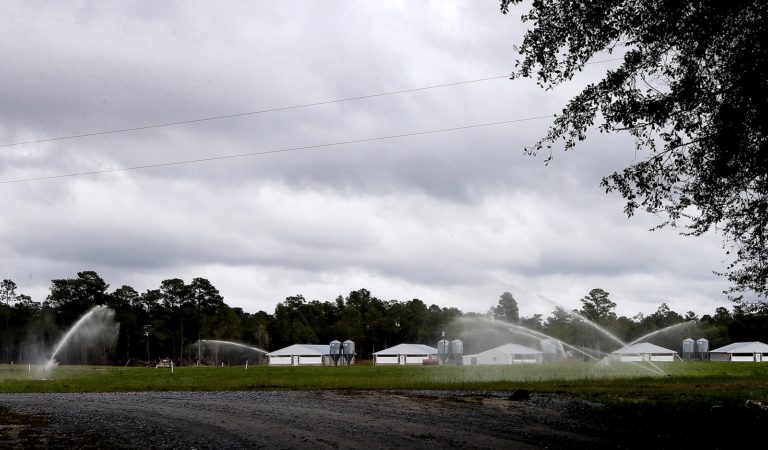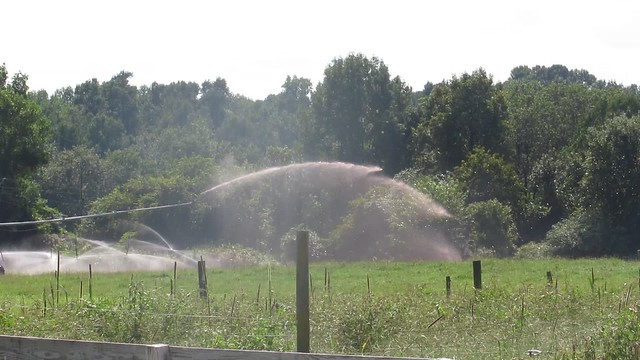Environmental Groups Challenge NCDEQ For Failing To Respond to Citizen Complaints
By: Waterkeeper Alliance

RALEIGH, NC – Yesterday, Waterkeeper Alliance, Cape Fear River Watch and the North Carolina Environmental Justice Network (NCEJN) joined together to challenge the North Carolina Department of Environmental Quality (NCDEQ) for a failure to respond to citizen complaints. The petition, filed by the UNC Center for Civil Rights on the groups’ behalf in the North Carolina Office of Administrative Hearings, alleges NCDEQ failed to respond as required to credible evidence of illegal activity by operators of industrial hog production facilities.
Each year, over 2,000 concentrated animal feeding operations (CAFOs) with capacity to house more than 9 million hogs in North Carolina generate billions of gallons of waste that is laden with nutrients, bacteria, and pathogens. This waste is stored in unlined cesspools which NCDEQ and the industry call “lagoons,” and sprayed onto adjacent fields. The vast majority of swine CAFOs in North Carolina are concentrated in the state’s coastal plain, where sandy soils, frequency of precipitation, and the shallow depth of the water table make land application of waste particularly threatening to water quality and public health.
State permits governing swine CAFOs prohibit land application when the risk of runoff or discharge is heightened, including more than 4 hours after the issuance of a flood watch by the National Weather Service (NWS).
“In advance of both Tropical Storm Hermine and Hurricane Matthew, we captured time-stamped and geo-located images of operators spraying waste more than 4 hours after a flood watch was issued and we reported those violations in complaints to NCDEQ,” said Will Hendrick, with Waterkeeper Alliance. “Additional complaints and evidence were reported verbally to the agency, but it appears those complaints were ignored.” 
“NCDEQ has let the people of North Carolina down by failing to act upon credible citizen complaints of illegal activities,” said Kemp Burdette, Cape Fear Riverkeeper. “Instead the agency has given industrial animal operations a free pass to break the law and pollute public waterways. This kind of negligence endangers North Carolinians and makes a mockery of environmental regulation in our state.”
The failure to investigate is particularly egregious because illegal pollution from swine CAFOs in Eastern North Carolina disproportionately impacts communities of color. Research shows that the percentages of African Americans, Latinos and Native Americans living within three miles of these swine CAFOs are 1.50, 1.41 and 2.22 times higher, respectively, than that of non-Hispanic whites.
“African American, Latino, and Native American communities disproportionately bear the burden of living near industrial hog operations in Eastern North Carolina. NCDEQ has ignored our continued requests for adequate regulation and monitoring of this industry for years. Their continued failure to investigate complaints filed by members of NCEJN and other impacted community members adds insult to injury for people living with the stench and water contamination caused by swine CAFOs,” said NCEJN co-director, Naeema Muhammad.
NCDEQ must stop prioritizing polluters over people. The agency must follow and enforce the law by investigating credible complaints and issuing a “Notice of Violation” where credible evidence shows a violation of the law.
Contact:
Kemp Burdette, Cape Fear River Watch, [email protected], (910) 264-8036
Elizabeth Haddix, UNC Center for Civil Rights, [email protected], (919) 445-0176
Will Hendrick, Waterkeeper Alliance, [email protected], (212) 747-0622 ext. 162
Naeema Muhammad, NC Environmental Justice Network, [email protected], (252) 314-0703
Maia Raposo, Waterkeeper Alliance, [email protected], (212) 740-0622 ext. 116